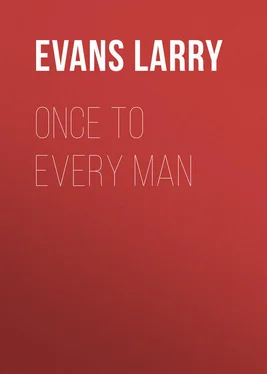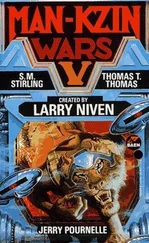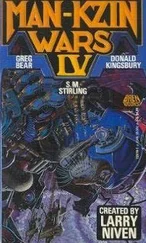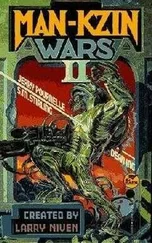Larry Evans - Once to Every Man
Здесь есть возможность читать онлайн «Larry Evans - Once to Every Man» — ознакомительный отрывок электронной книги совершенно бесплатно, а после прочтения отрывка купить полную версию. В некоторых случаях можно слушать аудио, скачать через торрент в формате fb2 и присутствует краткое содержание. Жанр: foreign_antique, foreign_prose, foreign_sf, на английском языке. Описание произведения, (предисловие) а так же отзывы посетителей доступны на портале библиотеки ЛибКат.
- Название:Once to Every Man
- Автор:
- Жанр:
- Год:неизвестен
- ISBN:нет данных
- Рейтинг книги:5 / 5. Голосов: 1
-
Избранное:Добавить в избранное
- Отзывы:
-
Ваша оценка:
- 100
- 1
- 2
- 3
- 4
- 5
Once to Every Man: краткое содержание, описание и аннотация
Предлагаем к чтению аннотацию, описание, краткое содержание или предисловие (зависит от того, что написал сам автор книги «Once to Every Man»). Если вы не нашли необходимую информацию о книге — напишите в комментариях, мы постараемся отыскать её.
Once to Every Man — читать онлайн ознакомительный отрывок
Ниже представлен текст книги, разбитый по страницам. Система сохранения места последней прочитанной страницы, позволяет с удобством читать онлайн бесплатно книгу «Once to Every Man», без необходимости каждый раз заново искать на чём Вы остановились. Поставьте закладку, и сможете в любой момент перейти на страницу, на которой закончили чтение.
Интервал:
Закладка:
But it was not the usual bundle of papers which came at the end of each week for which Young Denny was waiting. Old Jerry, who drove the post route, and had driven it as long as Denny could remember, was late tonight–he was even later than usual for Saturday night–and Denny’s hand tightened nervously upon the shaft of the pike-pole as he realized the cause of the delay.
For many weeks he had heard but little else mentioned on the village streets on his infrequent trips after groceries and grain. The winter sledding was over; the snow had gone off a month back with the first warm rain; just that afternoon he had made the last trip behind his heavy team down from the big timber back on the ridges, but during that month the other drivers with whom he had been hauling logs since fall had talked of nothing but the coming event.
From where he stood, looking out across the valley, Young Denny could see the huge bulk of the Maynard homestead–Judge Maynard’s great box of a house–silhouetted against the skyline, and back of it high piles of timber–framing and sheathing for the new barn that was going up. For Judge Maynard was going to give a barn-raising–an old-fashioned barn-raising such as the hill country had not seen in twenty years.
Already Young Denny knew that there were to be two team captains who would choose from among the best men that the country boasted, the very pick of strength and endurance and daring. And these, when the word was given, would swarm up with mallet and lock-pin over their half of the allotted work, in the race to drive home the last spike and wedge into place the last scantling. For days now with a grave sort of satisfaction which he hardly understood himself, Young Denny had time after time put all his strength against a reluctant log, skidding timber back on the hillside, and watched the lithe pike-pole bend half double under the steadily increasing strain. Somehow he felt very sure that one or the other of the captains would single him out; they couldn’t afford to pass him by.
But in that one respect only was Judge Maynard’s barn-raising to be like those that had passed down into history a score of years back. Every other detail, as befitted the hospitality of the wealthiest man in the hill country, was planned on a scale of magnificence before unheard of, and Denny Bolton stood and touched furtively with the tip of his tongue lips that were dry with the glamour of it all.
It was to be a masquerade–the dance which followed on the wide, clean floors–not the kind of a masquerade which the church societies gave from time to time to eke out the minister’s salary and which, while he had never attended, Young Denny had often heard described as “poverty-parties,” because everybody wore the oldest of his old clothes–but a marvelously brilliant thing of hired costumes. It did not mean so much to him, this last, and yet as he thought of it his tight lips twisted into a slow smile and his eyes swung from their hungry contemplation of the great Maynard house to a little clump of brushwood which made a darker blot against the black shadow of the hill from the crest of which the Judge’s place dominated the surrounding country. Little by little Denny Bolton’s lean face lost its hint of hardness; the lines that ran from his thin nose to the corners of his lips disappeared as he smiled–smiled with whimsical gentleness–at the light that glimmered from a single window through the tangled bushes, twinkling back at him unblinkingly.
There was a tiny cottage behind that light, a little drab cottage of a half dozen rooms. It stood, unpainted and unkempt, in a wedge-shaped acre of neglected garden which, between high weeds and uncut shrubbery, had long before gone to straggling ruin. And that wedge-shaped acre which cut a deep fissure in the edge of the immaculate pastures of Boltonwood’s wealthiest citizen was like a barbed thorn in Judge Maynard’s side.
The latter was not a judge in reality; partly the size of the cash balance which rumor whispered he carried at the county bank, partly the fact that he was the only lawyer in that section, had earned him the title. But every trick of his tricky trade which he could invent he had brought against the owner of that little, dilapidated cottage in a vain effort to force him to sell. And yet the acre of neglect and ruin still clung like an unsightly burr to the hem of his smooth-rolling acres.
The people of Boltonwood were given to calling John Anderson a fool, and not alone because he persisted in his senseless antagonism of a man as great in the township as was Judge Maynard. There was at least one other reason. It was almost twenty years now since the day when John Anderson had first appeared in the stern old hill town, bringing with him a frail slip of a woman with great, moist violet-blue eyes and tumbled yellow hair, whose very white and gold prettiness had seemed to their puritanical eyes the flaunting of an ungodly thing. There was a transparent pallor in her white skin and heavy shadows beneath her big dark eyes that made them seem even larger and duskier. A whispered rumor went around that she was not too strong–that it was the brisk keen air for which John Anderson had brought her to the hills.
The little drab cottage had been white then and there was scarcely a day but what the passers-by saw the slender girl, in soft fluttering things that contrasted painfully with their dingy calico, the thick gleaming mass of hair that crowned her head wind-tossed into her eyes, standing with her face buried in an armful of crimson blossoms in the same garden where the weeds were now breast high, or running with mad, childish abandon between the high hedgerows. And many a night after it was too dark to see they heard the man’s heavier bass underrunning the light treble of her laughter which, to their sensitive ears, was never quite free from a tinge of mockery.
CHAPTER II
For a year or more it was like that, and then the day came which, with dawn, found John Anderson changed into a gray-haired, white-faced man, whose eyes always seemed to be looking beyond one, and who spoke but seldom, even when he was spoken to. During the month that followed that night hardly a person in the village heard a word pass his lips, except, perhaps, those members of the church societies who had volunteered to help care for the baby.
He locked himself up in the small shop which occupied the back room of the house and day after day he worked there alone in a deadly quiet, strangely mechanical fashion. Sometimes far into the night they heard the tap-tap of his mallet as he chipped away, bit by bit, on a slender shaft of white marble, until more than one man in those days shook his head dubiously and vouchsafed his neighbor the information that John Anderson “wa’n’t quite right.”
A month passed during which the steady chip-chip scarcely ever ceased; and yet, when the work was finally finished and set up over the fresh little mound in the grounds behind the church, and they came to stand before it, they found nothing ready for them to say. For once the tongues of the hillsfolk were sobered into silence.
It was like her–that slim little white statue–so like her in its pallor and frailty of feature and limb that they only gasped and then fell to whispering behind their hands at the resemblance. And somehow, too, as they stared, their faces failed to harden as they had always hardened before, whenever they rebuked her slim, elfish untidiness, for upon the face of stone, which was the face of his wife, John Anderson’s chisel had left a fleeting, poignantly wistful smile that seemed touched with the glory of the Virgin Mother herself.
They merely stood and stared–the townsfolk–and yet they only half understood, for when it was noised about the street a few days later that John Anderson had given up forever his occupation of chiseling tombstones for the bleak Boltonwood cemetery–an occupation which at least had yielded him a bare living–and had locked himself up in that back room to “putter with lumps of clay,” he was instantly convicted of being queer in the eyes of the entire thrifty community, even without his senseless antagonism of the Judge in the years that followed to clinch the verdict.
Читать дальшеИнтервал:
Закладка:
Похожие книги на «Once to Every Man»
Представляем Вашему вниманию похожие книги на «Once to Every Man» списком для выбора. Мы отобрали схожую по названию и смыслу литературу в надежде предоставить читателям больше вариантов отыскать новые, интересные, ещё непрочитанные произведения.
Обсуждение, отзывы о книге «Once to Every Man» и просто собственные мнения читателей. Оставьте ваши комментарии, напишите, что Вы думаете о произведении, его смысле или главных героях. Укажите что конкретно понравилось, а что нет, и почему Вы так считаете.












